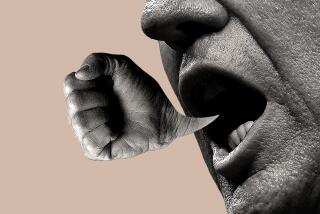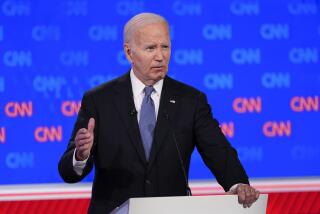President Finds Voice, Leadership in Terrorism Crisis, Experts Say
- Share via
WASHINGTON — Last year, as he was running for president, George W. Bush was asked to describe the toughest crisis he had faced as governor of Texas.
Comforting a family in Del Rio that lost its home in a flood, Bush replied a bit awkwardly. “It broke my heart,” he said.
Now Bush is grappling with a crisis more daunting than many of his predecessors ever faced--and so far, to the surprise of some detractors, he has handled it with considerable skill.
The largely untested president has embraced the role of communicator-in-chief, spending large chunks of his time on public statements and appearances to ready the nation for war. That has added up to significantly more public exposure than earlier in his presidency.
He appears to have delegated the details of foreign policy planning to his advisors--Vice President Dick Cheney, National Security Advisor Condoleezza Rice, Secretary of State Colin L. Powell and Defense Secretary Donald H. Rumsfeld--while forcefully setting the general tone and direction.
Bush knew almost immediately after last week’s attack on New York and the Washington area that he wanted to respond with a war on terrorism, aide Karen Hughes said. But he held off using tough words on the first day of the crisis because he felt the nation needed calming first.
“He deliberately, that evening, did not use the word ‘war’ because . . . he felt his primary goal that evening was reassurance,” she said.
By the next morning, she said, Bush was in the Oval Office scribbling notes on a pad, trying out some of the phrases that would become his catchwords over the days to come.
“We need to prepare the country for what lies ahead,” she quoted him as saying. “And that’s the time at which he said . . . [that] acts of war have been committed against us and that he wanted to talk about the different type of enemy that we’re facing.
“He handed me a couple of notes.” She pulled a piece of paper from a folder. “There’s one right here: ‘This is an enemy that runs and hides--but it won’t be able to hide forever.’ ”
The result has been a stream of daily rallying cries to the nation, from an eloquent sermon at Washington’s National Cathedral on Friday to a cowboy-style demand on Monday for the capture of suspected terrorist chief Osama bin Laden “dead or alive.” (Bush tried that line first in a telephone call to Mexican President Vicente Fox, who liked it.)
Some foreign policy experts worry that Bush may have turned up his rhetoric too high by vowing to eliminate terrorism everywhere in the world and by using the word “crusade,” which to Muslims summons the unfortunate image of the medieval Christian wars against Islam.
But compared with earlier presidents who faced crises in their first year--Bill Clinton mired in Somalia, Bosnia-Herzegovina and Haiti, for example--Bush appears to have made no major mistakes.
Instead, he has stepped into the role of war president in a way that builds on his strengths as a politician--including his penchant for focusing on one big issue at a time--while minimizing his weaknesses.
One result has been soaring approval from the public: 77% in a Los Angeles Times Poll conducted last week, even higher in other surveys. That compares to a modest 50% to 55% in three national surveys released in June.
Presidents’ public approval ratings almost always leap in times of national crisis, a phenomenon pollsters call the “rally-round-the-flag effect.” But even some Bush aides sound surprised by the magnitude of the jump.
“For almost the first time in his presidency, he’s beginning to find his voice,” said Fred Greenstein, a Princeton University scholar of the presidency who has been critical of Bush in the past. “There’s an aphorism that’s attributed to Harry S. Truman: ‘The presidency is an institution in which one either grows or swells.’ We may be watching George W. Bush grow.
“Part of what makes this possible is there is a role out there with history behind it; there are certain things a president does in a national tragedy. But that doesn’t mean the president does those things, or does them right. It’s quite possible to get it wrong.”
“I think he’s doing quite well so far,” said a former senior official in the Clinton White House. “No missteps worth talking about.”
Bush’s approach has been marked by three characteristics. He has devoted himself to the crisis with single-minded focus--refusing, for example, to be pulled into side issues such as House Republicans’ hope that the time might be ripe for a capital gains tax cut. He has spent much of his time rallying the country to the idea of a full-throated war against terrorism, and on communicating that resolve to foreign leaders. And he has allowed his foreign policy aides to work out the details of military and diplomatic strategy “without micro-managing,” as one official carefully put it.
Bush’s top aides say the president makes every major decision and presides vigorously over the National Security Council meetings that have occurred almost daily since the attacks. But Bush’s schedule suggests he is spending less time on policy details than did Clinton--who once held a six-hour meeting on Bosnia--and more time on politics and diplomacy.
Like his father during the months before the 1991 Persian Gulf War, for example, Bush has spent hours on the phone with foreign leaders. As of Tuesday, he had contacted roughly two dozen, several more than once.
He hosted French President Jacques Chirac at the White House on Tuesday and will meet with a stream of others, including British Prime Minister Tony Blair, in the days and weeks to come. (Chirac said he brought “the total solidarity of France” but cautioned: “I don’t know whether we should use the word ‘war.’ ”)
Bush has also begun spending time on the domestic repercussions of the crisis; he met for the first time Tuesday with a new Domestic Consequences Group chaired by his deputy chief of staff, Josh Bolten.
But Bush, by spending so much energy on public communication, is doing something his father never fully achieved: forging a strong national consensus that could also result in greater support for his domestic agenda.
“He’s learned the importance of vision,” Greenstein said. “He’s very explicit that it was his father’s mistake to fall short on that. He’s made a point, even before this, of standing for a few big things and a few small things that everyone could identify.”
Even many skeptics have been disarmed. “He is a uniquely inarticulate man,” said Stephen Hess, a presidential scholar at Washington’s Brookings Institution. “But his job here is as politician-in-chief. . . . The test is of his political skills: his ability to sense where the nation can go and then take advantage of that.
“You don’t want a president who gets too deep into the details, a president as kibitzer-in-chief. You want a president to make basic political decisions. You hope they’re right. And you want other people in place to implement them.”
Times staff writer Edwin Chen contributed to this report.
More to Read
Get the L.A. Times Politics newsletter
Deeply reported insights into legislation, politics and policy from Sacramento, Washington and beyond. In your inbox twice per week.
You may occasionally receive promotional content from the Los Angeles Times.









